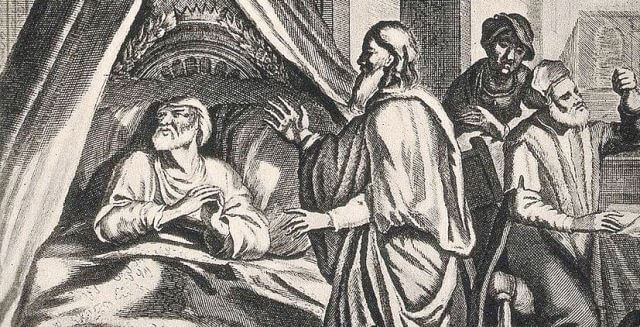
In chapter 31, the psalmist expresses his faith that God will protect him against all enemies. Yet the meaning of the first part of the following verse is unclear:
“בְּיָדְךָ עִתּוֹתָי; הַצִּילֵנִי מִיַּד אוֹיְבַי וּמֵרוֹדְפָי. (תהילים ל"א:ט"ז)
“My times are in Your hand; rescue me from my enemies and my pursuers.” (31:16)
What does it mean that our “times” are in God’s hand?
Hezekiah’s Death Sentence
The book of Isaiah relates that King Hezekiah once became deathly ill and Isaiah came to visit him. The prophet, however, did not have good news for the righteous king. “So has God stated: Set your house in order, for you will die and not live” (Isaiah 38:1). Many people would have called it quits after hearing a respected prophet pronounce a death sentence so decisively, but Hezekiah turned to the wall and prayed that he might live.
And God listened, adding 15 years to his life!
The story as narrated in Isaiah is quite brief, but the Talmud (Berachot 10a) fills in details about the conversation between Isaiah and King Hezekiah. The prophet explained to the king the reason for his illness and imminent death. But Hezekiah refused to accept this heavenly decree, telling Isaiah firmly:
“Son of Amotz, stop your prophesying and leave! I have a tradition from my grandfather’s house [i.e., from King David]: Even if a sharp sword is placed over one’s neck, one should not refrain from praying for mercy.”
King Hezekiah’s response is surprising. It is one thing to have faith in God’s help and protection when facing troubles. But what made Hezekiah think that his prayers could cancel a heavenly decree, one that was confirmed by a prophet?
Beating the System
Decrees from heaven emanate from the eternal workings of the universe, from the overall system of interrelated chains of cause and effect. Prophecy also deals with this long-term perspective of Divine rule.
However, human beings are granted free will within the realm of the here and now. We have the ability to change and improve, and we are judged accordingly. Divine providence takes into account our current state, freeing it from the binds of previous causes.
The efficacy of prayer is precisely in its ability to elevate the individual, allowing him to overcome decrees belonging to the future via spiritual growth in the present. For this reason, the Sages referred to prayer as chayei sha’ah - “life in the present hour” (Shabbat 33b). Prayer is an instrument of our free will, allowing us to break free from the forces of causality and change our destiny.
When Isaiah informed Hezekiah that he was sentenced to die, the king retorted, “Stop your prophesying and leave!” Your prophecy may be true, but it is only according to the yardstick of overall Divine rule. We also have the redemptive power of prayer and chayei sha’ah. “Even if a sharp sword is placed over our neck, we should not refrain from praying for God’s mercy.”
Hezekiah learned this lesson from his ancestor, King David. David’s statement, בידך עיתותי “My times are in Your hand,” means that also our current times and activities are in God’s hand and purview. This is the power of prayer: it can uplift a person in his present state, overcoming decrees that come from the realm of causality and overall Divine rule.
(Adapted from Ein Eyah vol. I, pp. 54-55)
Illustration image: Hezekiah lies sick in his bed (Jan Lamsveld, c. 1700)





